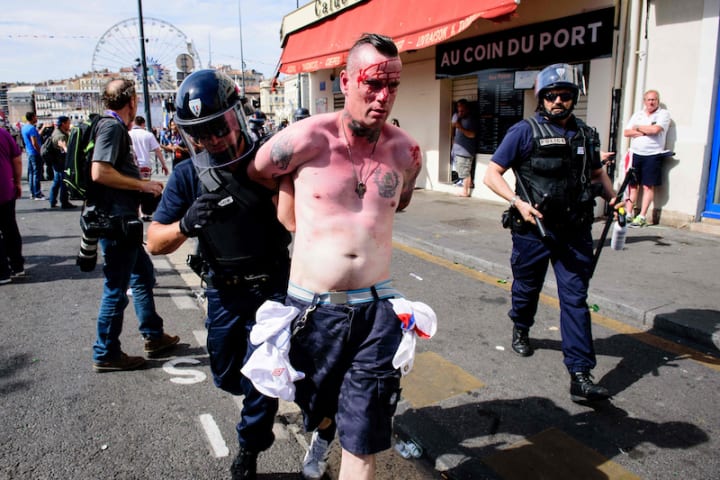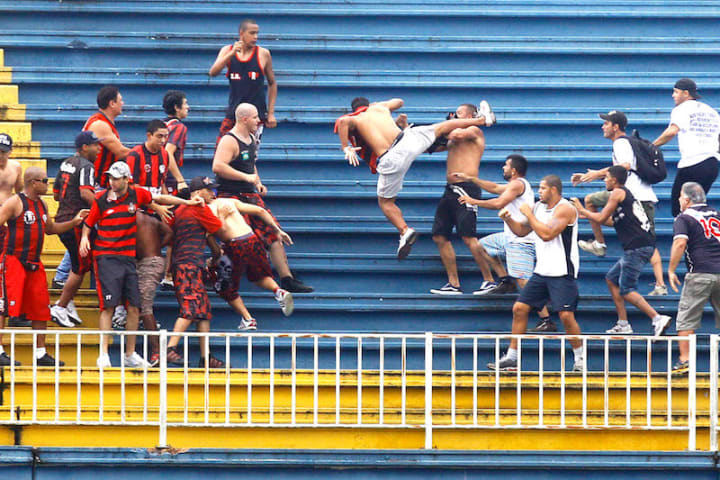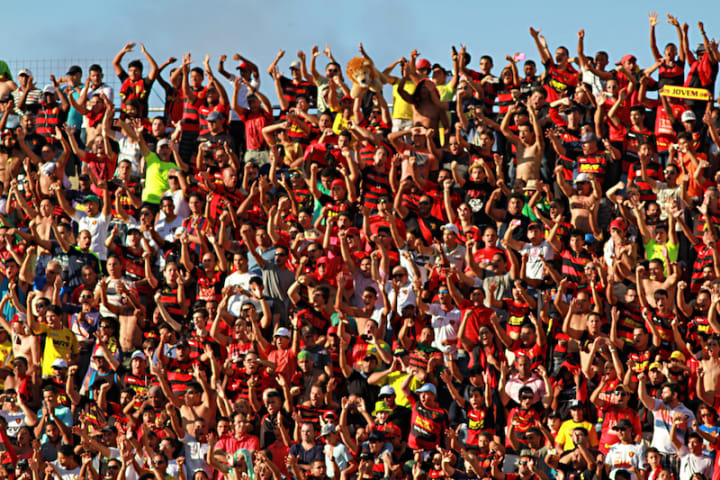What Football Hooliganism Is and How To Stop It
Educate yourself on football hooliganism, how it's caused, and how to put an end to it.

Football hooliganism is an issue in our society that has been around for centuries. To start spreading the word on how can it be prevented, we first must educate those unaware of the issue.
So what exactly is football hooliganism? How is it even caused? And what are the repercussions if we don't put an end to it? We go over each of these questions, as well as five ways to put an end to the violence.
What is football hooliganism?

Traced back to the 14th century, football hooliganism is described as violent, disorderly, or destructive behavior by spectators of football events.
A conflict that is often involving of gangs, or football firms, hooligan firms can even be referred to as an "army," "boys," a "crew," or "casuals."
These conflicts often occur either before, during, or after football matches. They typically occur away from the stadiums to avoid being arrested or further complications. Locations would be selected prior to the interactions even occurred.
Some of the behavior involved in football hooliganism includes taunting, spitting, throwing of objects, unarmed fighting, fighting with weapons like rocks, knives, machetes, firearms, bats, and bottles, and disorderly crowd behavior.
Some of these actions can even include fences, fixtures, and walls to collapse, due to the incredible force of pushing, fighting, and attempting to flee.
What are the effects of football hooliganism?
As just some of the many reasons why football hooliganism needs to be stopped, these violent behaviors due to football rivalries may cause not only destruction, but death. In some extreme cases of hooliganism, there have been reports of bystanders, police, and hooligans being killed.
It has gone as far as riot police intervening with the encounters. This would include water cannons, armored vehicles, police dogs, and even tear gas.
This violence has even been given its own name, with "aggro" which is short for aggravation, or "bovver," a Cockney pronunciation of bother or trouble. Much of these disorderly actions are influenced by alcohol, drugs, and anger.
Why does this violence occur?
In a study done by Paul Gow and Joel Rookwood about sports in 2008 with Liverpool Hope University, the men discovered this:
"Involvement in football violence can be explained in relation to a number of factors, relating to interaction, identity, legitimacy and power. Football violence is also thought to reflect expressions of strong emotional ties to a football team, which may help to reinforce a supporter’s sense of identity."
With this being said, the influence of alcohol, political conflict, and police handling are all causes of the issue. Other causes are simply the fact of a favorite team losing, causing frustration and anger, as well as a team giving an unsportsmanlike performance, setting the tone for their fans.
How We Can Fix This: Alcohol Limitations

Limiting alcohol consumption at football events is one of the best ways to limit football hooliganism. Though you can never ban alcohol consumption altogether, having stricter rules for allowing intoxicated fans to enter the grounds as well as limiting the serving of alcohol at the events is a great way to start.
In 2016, the French government even urged all of the host cities to ban the sale of alcohol in areas sensitive to hooliganism. Plus, the city of Lens that held the Wales and England match prohibited drinking on its streets 24 hours in advance of the kick-off.
How We Can Fix This: Match Time Changes
Beginning matches earlier is yet another way to try and fix this huge issue. As an attempt to stop the violence caused by football fans, pushing matches forward a few hours can help stop the misconduct.
As an attempt to stop heavy drinking and sneaky fighting, matches being scheduled for noon are a better bet for fans to be less violent. This way, there will be less irritability, more visibility for police, and less drinking.
How We Can Fix This: Bans
Having an overbearing punishment for football hooliganism that is made against all football fans will better allow people to understand the seriousness of this issue. During the Manchester City Champions League against CSKA Moscow in 2014, fans were banned as a punishment for hooliganism, racist chanting, and a series of offenses.
The stadium was empty for this match, and the fans were shaken with reality. A way to put the issue into perspective, banning fans from stadiums will allow them to understand the size of the violence.
How We Can Fix This: Segregation

Separating home fans from away fans is a great place to start to try and avoid hooliganism. This way, opposing fans will hopefully not be able to irritation, threaten, or cause violence between each other.
Separating the two teams into different stands will help avoid violence altogether, and to take thing further, there can even be separated entrances and exits.
How We Can Fix This: Community Building
As our last attempt at putting a stop to football hooliganism, community building among fans is just as important as anything we've previously covered. What can also be referred to as "fan coaching," fans in each country should be taught about the respect of opposition, as well as the correct way to accept defeat by avoiding violence.
This must begin with our children and young people who play and watch football. This generation needs to be taught to hold higher values, and this can be taught by their own coaches as well as their favorite star athletes. Plus, law enforcement should also take a role in this education, as a great way to enforce the message, as well as educating them on the heavy consequences of hooliganism.
About the Creator
Kelsey Lange
Passionate about writing, animals, makeup, movies, friends, family, learning, exercising, and laughing!
Enjoyed the story? Support the Creator.
Subscribe for free to receive all their stories in your feed. You could also pledge your support or give them a one-off tip, letting them know you appreciate their work.






Comments
There are no comments for this story
Be the first to respond and start the conversation.